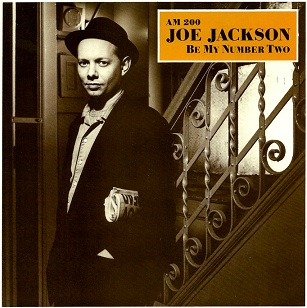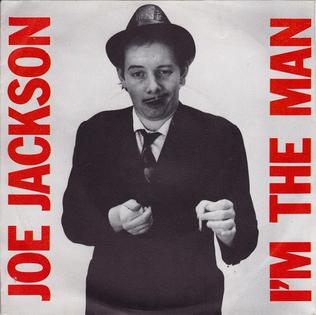
David Ian "Joe" Jackson is an English musician, singer and songwriter. Having spent years studying music and playing clubs, he scored a hit with his first release, "Is She Really Going Out with Him?", in 1979. It was followed by a number of new wave singles, before he moved to more jazz-inflected pop music and had a top 10 hit in 1982 with "Steppin' Out". Jackson is associated with the 1980s Second British Invasion of the US. He has also composed classical music. He has recorded 20 studio albums and received five Grammy Award nominations.

Look Sharp! is the debut album by Joe Jackson, released in January 1979. The album features one of Jackson's most well-known songs, "Is She Really Going Out with Him?", as well as the title track "Look Sharp", "Sunday Papers", "One More Time" and "Fools in Love".

I'm the Man is the second album by English musician Joe Jackson, released in October 1979. Released shortly after Jackson's breakthrough debut, Look Sharp!, I'm the Man saw Jackson continue the style of his earlier album. Singles from the album included "I'm the Man" and "It's Different for Girls", the latter of which was his biggest UK chart single, peaking at number five on the UK Singles Chart.

Body and Soul is the seventh studio album by English singer-songwriter Joe Jackson, released on 14 March 1984 by A&M Records. Jackson's first fully digital project, it peaked at No. 14 in the UK, while in the US it reached No. 20. Described by one reviewer as a sophisti-pop album, the tracks are a mix of pop, jazz and Latin music, showcasing the hit single "You Can't Get What You Want ". Two other singles fared well, with "Happy Ending" charting in five countries, and "Be My Number Two" enjoying moderate success in the UK.

"Is She Really Going Out with Him?" is a song written and performed by British musician Joe Jackson. It was released in October 1978 as his debut single and was later included on Jackson's debut album, Look Sharp! The track was one of the first Jackson recorded with his new backing band, a band he would perform with for his first three albums. Written as a humorous commentary on women dating unattractive men, the song contains a prominent bass line and a chorus praised by critics as memorable. Jackson has since stated that the song's reputation for being angry was untrue.

"Why Me" is a song written by Dennis DeYoung that was first released on Styx's 1979 double-platinum album Cornerstone. It was also released as the second single from the album, and reached #26 on the Billboard Hot 100 and #10 on the Canada RPM Top 100 Singles chart.

Stepping Out: The Very Best of Joe Jackson is a compilation album from the English musician Joe Jackson. The songs, arranged in chronological order, are taken from nine of his first twelve albums, all of which were released on the A&M Records label. Stepping Out: The Very Best of Joe Jackson reached No. 7 in the UK Albums Chart in October 1990. By this time Jackson had parted company with A&M, with his next few releases being on the Virgin Records label.

"It’s Different for Girls" is a song by Joe Jackson appearing on his 1979 album, I'm the Man. The song has since become one of his most successful singles, notably being the highest charting Joe Jackson single in the UK. Covers have been recorded and released by several different artists.

"One More Time" is a song by the British new wave musician Joe Jackson. It was released as the third single from his debut album, Look Sharp!, in 1979. Inspired by a breakup Jackson had, the song features a guitar riff and lyrics detailing a collapsing relationship.

"Real Men" is a song by British singer-songwriter and musician Joe Jackson, which was released in 1982 as the lead single from his fifth studio album Night and Day. It was written by Jackson, and produced by Jackson and David Kershenbaum. The song became a hit only in the Dutch language area and Australia. In the Dutch Top 40 it reached the 15th position, and in the Flemish Radio 2 Top 30 it reached the 25th position. "Real Men" reached No. 89 in the UK and No. 6 in Australia. A music video was filmed to promote the single, directed by Steve Barron. The song was covered by Tori Amos on her 2001 album of gender-swapped covers, Strange Little Girls.

"You Can't Get What You Want (Till You Know What You Want)" is a single from Joe Jackson's 1984 album Body and Soul.

"Happy Ending" is a song by British singer-songwriter and musician Joe Jackson, which was recorded as a duet with Elaine Caswell and released in April 1984 as the second single from Jackson's sixth studio album Body and Soul. The song was written by Jackson, and produced by Jackson and David Kershenbaum. "Happy Ending" reached No. 58 in the UK Singles Chart and No. 57 on the US Billboard Hot 100.

"Be My Number Two" is a song by British singer-songwriter and musician Joe Jackson, which was released in 1984 as the third and final single from his sixth studio album Body and Soul. It was written by Jackson, and produced by Jackson and David Kershenbaum. "Be My Number Two" reached No. 70 in the UK and remained in the charts for four weeks.

"Right and Wrong" is a song by British singer-songwriter and musician Joe Jackson, which was released in 1986 as the lead single from his live album Big World. It was written by Jackson, and produced by David Kershenbaum and Jackson. "Right and Wrong" peaked at No. 90 on the UK Singles Chart, and No. 11 on the US Billboard Album Rock Tracks chart.

"(He's a) Shape in a Drape" is a song by British singer-songwriter and musician Joe Jackson, which was released in 1988 as a single from the soundtrack album of the American biographical comedy-drama film Tucker: The Man and His Dream. The song was written and produced by Jackson.

This page lists albums, singles, and compilations by the musician Joe Jackson. Jackson's recording career as a solo artist began in 1979, with the release of his debut album Look Sharp!. The album was recorded with the Joe Jackson Band, with whom he would release two more albums, I'm the Man and Beat Crazy, the latter of which was credited to the full band rather than simply Jackson.

"I'm the Man" is a song written and performed by Joe Jackson, appearing on the album of the same name. Written for the album's "spiv rock" theme, the song is a new wave rock track with humorous lyrics.

"Mad at You" is a song by the Joe Jackson Band, which was released in 1980 as the lead single from Jackson's third studio album Beat Crazy. The song was written and produced by Jackson.

"Memphis" is a song by English singer-songwriter and musician Joe Jackson, which was released in 1983 as a single from the soundtrack album of the American film Mike's Murder. The song was written by Jackson, and produced by Jackson and David Kershenbaum. "Memphis" reached No. 85 on the US Billboard Hot 100.

"One to One" is a song by the Joe Jackson Band, released as the third single from Jackson's third studio album Beat Crazy (1980). The song was written and produced by Jackson. It was released as a single in the US and Canada in 1980 and the UK and Australia in 1981. It failed to enter the UK Singles Chart, but did reach number 123 on the Record Business Singles Chart.




















